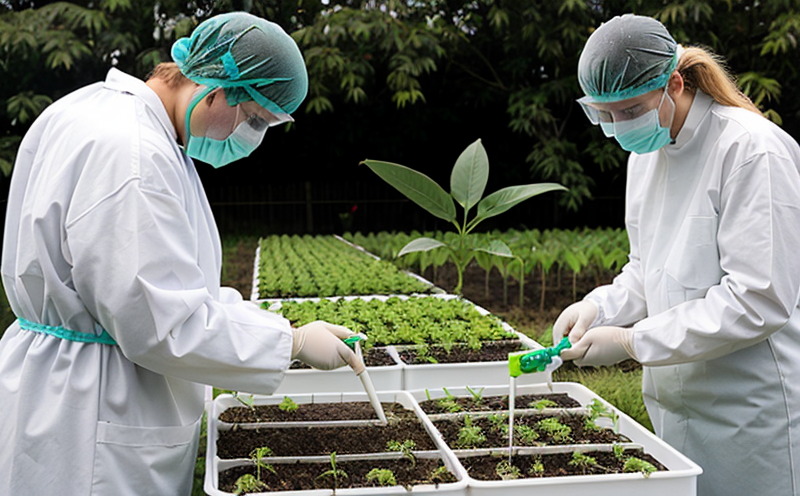Clavibacter Michiganensis (Bacterial Canker) Testing
The testing of Clavibacter michiganensis subsp. michiganensis, commonly referred to as bacterial canker, is crucial for the agricultural and forestry sectors due to its devastating impact on crop health and productivity. This bacterium primarily affects tomatoes but also poses significant risks to other crops such as peppers, potatoes, and ornamental plants. The ability to detect this pathogen early in the plant’s lifecycle can prevent widespread outbreaks and minimize economic losses.
The testing process involves several critical steps that ensure accurate identification of Clavibacter michiganensis subsp. michiganensis. Initially, symptomatic plants are collected from fields or nurseries showing signs of bacterial canker. These symptoms include wilting leaves, browning at the stem base, and necrotic lesions on stems. Upon arrival in our laboratory, plant samples undergo rigorous processing to extract DNA for molecular analysis.
Our testing methodology adheres to international standards such as ISO 14246:2005 and EN ISO 17278:2013, ensuring compliance with global benchmarks. The primary technique used is polymerase chain reaction (PCR) coupled with DNA sequencing to identify the presence of the C. michiganensis subsp. michiganensis bacterium. This approach offers high specificity and sensitivity, enabling accurate detection even in low concentrations.
The PCR process involves several stages: first, extraction of plant tissue for genomic DNA isolation; second, amplification of specific bacterial DNA sequences using primers designed to target the C. michiganensis subsp. michiganensis genome; and finally, sequencing to confirm the identity of the pathogen. This method ensures reliable identification even when the bacterium is present in small quantities.
The results are typically ready within 3-5 business days after sample submission. Our laboratory issues a comprehensive report detailing the presence or absence of Clavibacter michiganensis subsp. michiganensis, along with recommendations for management and control measures if positive findings are reported.
In summary, this testing service is essential for maintaining plant health in agricultural and forestry settings by providing early detection capabilities that can prevent the spread of bacterial canker. This proactive approach helps protect crops from significant damage and supports sustainable farming practices.
Why It Matters
Bacterial canker caused by Clavibacter michiganensis subsp. michiganensis is a critical concern for farmers and horticulturists worldwide due to its ability to severely affect plant health and yield. The bacterium spreads easily through contaminated water, soil, and gardening tools, making it challenging to manage once introduced into a cultivation environment.
- Rapid Spread: The bacterium can rapidly infect entire fields or greenhouses, leading to significant crop losses if not detected early.
- Economic Impact: Infected plants suffer from reduced growth rates and increased susceptibility to other pathogens, resulting in lower yields and lower-quality produce.
- Contamination Risks: Contaminated seeds or transplants can introduce the pathogen into new regions, complicating control efforts.
The early detection provided by our testing service is vital for preventing these issues. By identifying infected plants promptly, farmers and horticulturists can implement targeted management strategies to limit further spread and mitigate economic impacts.
Why Choose This Test
- High Accuracy: Our PCR-based testing method ensures accurate identification of the Clavibacter michiganensis subsp. michiganensis bacterium, even in low concentrations.
- Compliance with Standards: Adherence to international standards such as ISO 14246:2005 and EN ISO 17278:2013 guarantees the reliability of our test results.
- Quick Turnaround Time: Results are available within 3-5 business days, allowing for timely implementation of control measures.
- Comprehensive Reporting: Detailed reports include recommendations for managing and controlling bacterial canker in affected areas.
In addition to these benefits, our service offers a range of additional advantages. Our team of experts ensures that every sample is handled with the utmost care, ensuring accurate results. We also provide training and support to help clients understand how to prevent future outbreaks effectively.
Customer Impact and Satisfaction
The impact of our Clavibacter michiganensis subsp. michiganensis testing service extends beyond just the detection of bacterial canker; it plays a pivotal role in protecting agricultural and forestry industries from significant economic losses. By providing early warnings, we enable farmers and horticulturists to take proactive measures that minimize damage and preserve plant health.
- Economic Stability: Early intervention prevents the spread of bacterial canker, thereby safeguarding crop yields and maintaining market stability.
- Sustainable Farming Practices: Our testing service supports sustainable agricultural practices by promoting the use of integrated pest management strategies.
- Increased Productivity: By identifying infected plants early, we help ensure healthier crops that can withstand other stressors more effectively.
We pride ourselves on delivering exceptional customer satisfaction through our reliable testing services. Our clients benefit from peace of mind knowing their operations are protected against the risks associated with bacterial canker. Positive feedback and repeat business from satisfied customers affirm the value we provide in this area.





